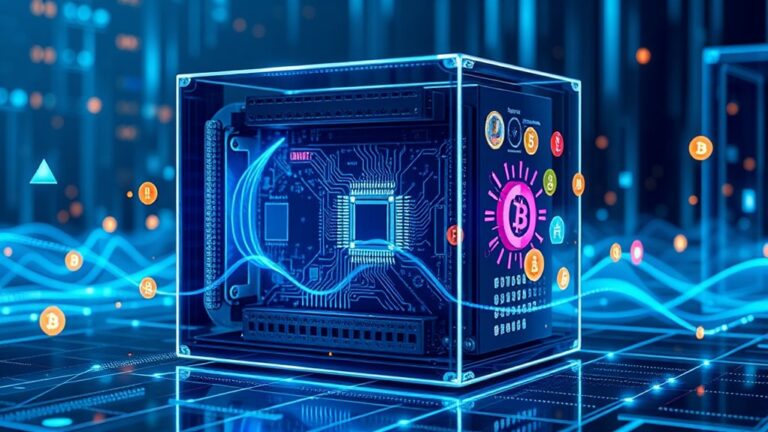
The Role of AI in Crypto and Blockchain: Essential Trends and Benefits
Artificial intelligence greatly impacts cryptocurrency and blockchain sectors by enhancing security, optimizing trading strategies, and ensuring regulatory compliance. AI systems monitor transactions in real time to detect anomalies and prevent fraud. They analyze large datasets for improving trading decisions and identifying market trends. Additionally, AI contributes to the scalability of blockchain networks and enhances smart contracts through adaptive execution. Overall, AI’s role is pivotal in shaping a more efficient and secure crypto environment, offering many benefits yet to explore.
Key Takeaways
- AI enhances security in cryptocurrency transactions by detecting anomalies and preventing fraud through real-time monitoring and predictive analytics.
- Automated trading systems powered by AI optimize trading strategies, minimizing emotional biases and enabling quick decision-making in volatile markets.
- AI improves blockchain scalability by optimizing transaction processing and implementing solutions like sharding and Layer 2 technologies for efficiency.
- Decentralized AI marketplaces leverage blockchain for secure development, incentivizing participation through token-based economies while ensuring data integrity.
- AI tools help organizations adapt to evolving regulatory frameworks, enhancing compliance accuracy and navigating complex requirements in the crypto landscape.
Enhanced Security Through AI Integration

In the evolving landscape of cryptocurrency and blockchain technology, enhanced security through AI integration plays an essential role in safeguarding digital assets.
AI systems excel at identifying and preventing cyber attacks by analyzing transaction patterns and detecting anomalies in real-time. This continuous monitoring helps to identify potential account compromises and phishing attempts effectively.
Additionally, advanced algorithms track fund movements, which aids in preventing money laundering activities. AI also employs predictive analytics to anticipate risks associated with transactions, allowing for timely mitigation.
Moreover, AI-driven authentication systems strengthen identity management, ensuring only legitimate user activities occur on the network.
Together, these AI capabilities create a more secure environment for cryptocurrency transactions, considerably reducing vulnerabilities and enhancing user trust. Furthermore, implementing two-factor authentication (2FA) can significantly bolster security measures against unauthorized access.
Efficient Trading Strategies With AI
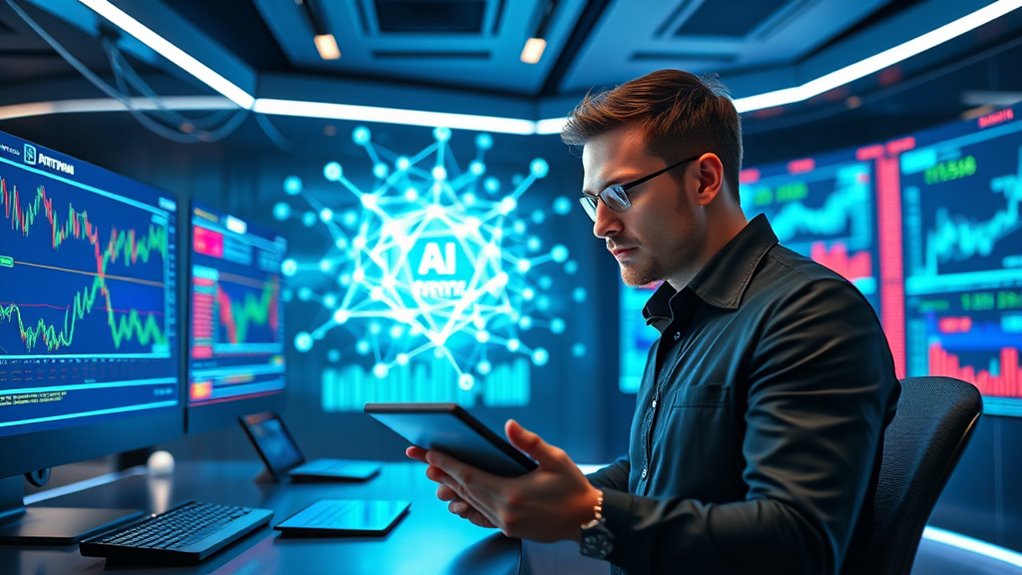
How can artificial intelligence transform trading strategies in the cryptocurrency market? AI enhances trading by analyzing vast datasets, enabling precise decision-making. Automated trading systems execute trades without human interference, minimizing emotional biases. Additionally, AI adapts to real-time market changes, optimizing strategies continuously.
| Feature | Benefit |
|---|---|
| Data Analysis | Quick identification of patterns |
| Automated Trading | Reduces human error and bias |
| Real-time Adaptation | Keeps strategies effective |
Machine learning techniques, such as reinforcement learning, further refine trading decisions. This continuous learning process allows AI systems to improve over time, providing traders with a competitive edge and tailored strategies that align with their goals and risk tolerance.
Predictive Analysis for Informed Investments
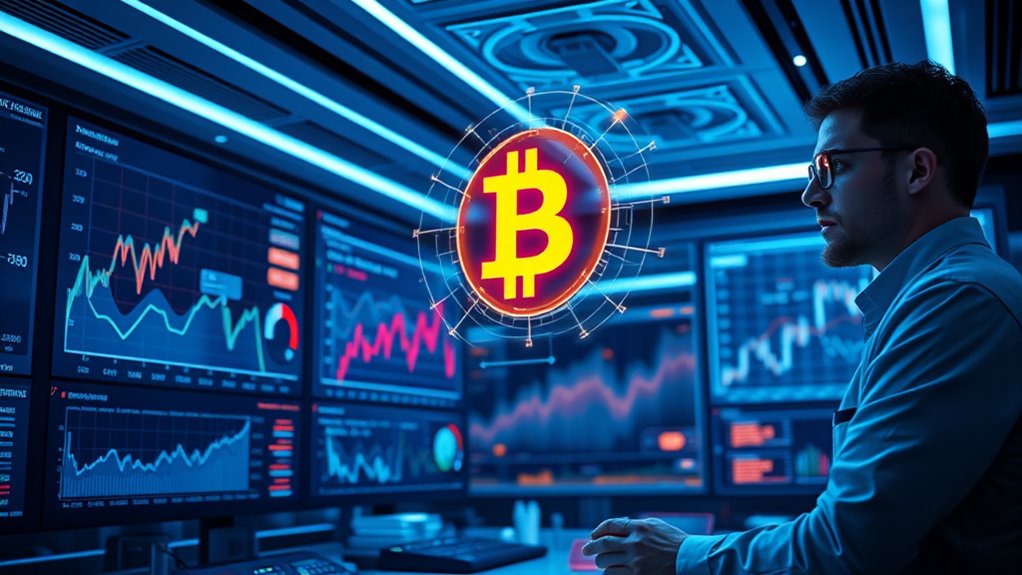
Predictive analysis leverages advanced machine learning algorithms, such as LSTM and Recurrent Neural Networks, to process vast datasets. This includes historical price trends, social media sentiment, and on-chain data, allowing investors to identify market trends.
By analyzing market sentiment through social media and news articles, predictive analysis helps assess investor attitudes, which can impact price movements. Its ability to recognize complex patterns offers insights that may elude human analysts.
Additionally, AI’s real-time processing capabilities enable traders to respond swiftly, improving the accuracy of investment decisions. Moreover, as the DeFi sector continues to grow and align with traditional finance, predictive analysis can provide crucial insights into emerging investment opportunities.
Ultimately, predictive analysis equips investors with the knowledge to make informed choices and manage risks effectively in the volatile crypto landscape.
Scalability Solutions Addressed by AI
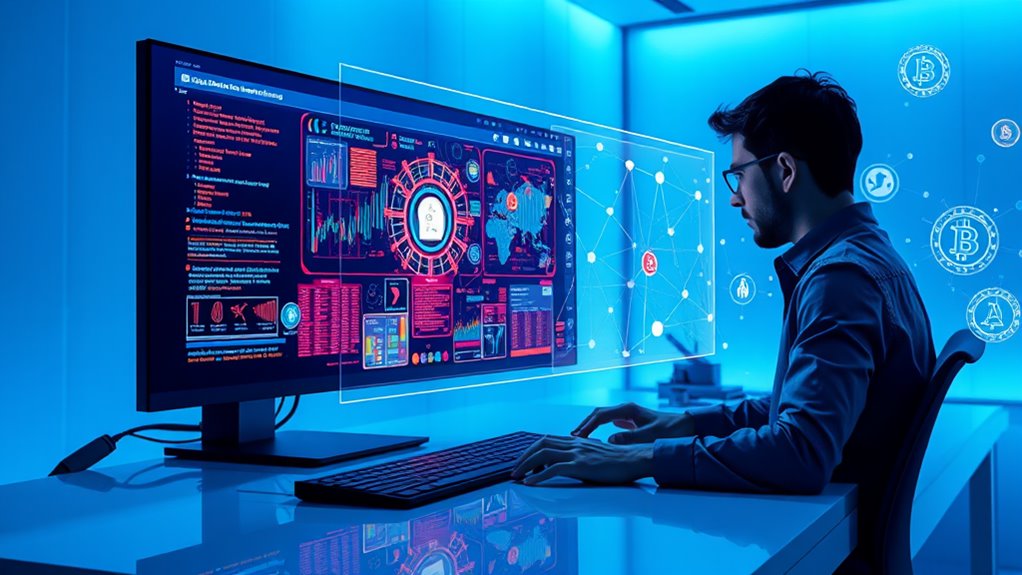
As blockchain technology continues to evolve, addressing scalability challenges has become increasingly important for its widespread adoption.
Blockchain networks often encounter issues like slow transaction speeds and high fees, which can deter users.
Artificial Intelligence (AI) plays a significant role in enhancing scalability by optimizing transaction processing and improving consensus mechanisms.
Solutions such as sharding and new consensus methods (Layer 1) work to enhance efficiency, while Layer 2 solutions, like state channels and rollups, facilitate faster and cheaper transactions by offloading network activity.
Additionally, AI algorithms can analyze transaction patterns to predict peak times, enabling dynamic resource allocation.
This integration of AI not only reduces latency but also improves overall network performance, making blockchain technology more viable for everyday use. Moreover, the combination of AI with Layer 2 solutions can significantly enhance transaction speed and reduce gas fees, further driving adoption.
Evolution of Smart Contracts With AI
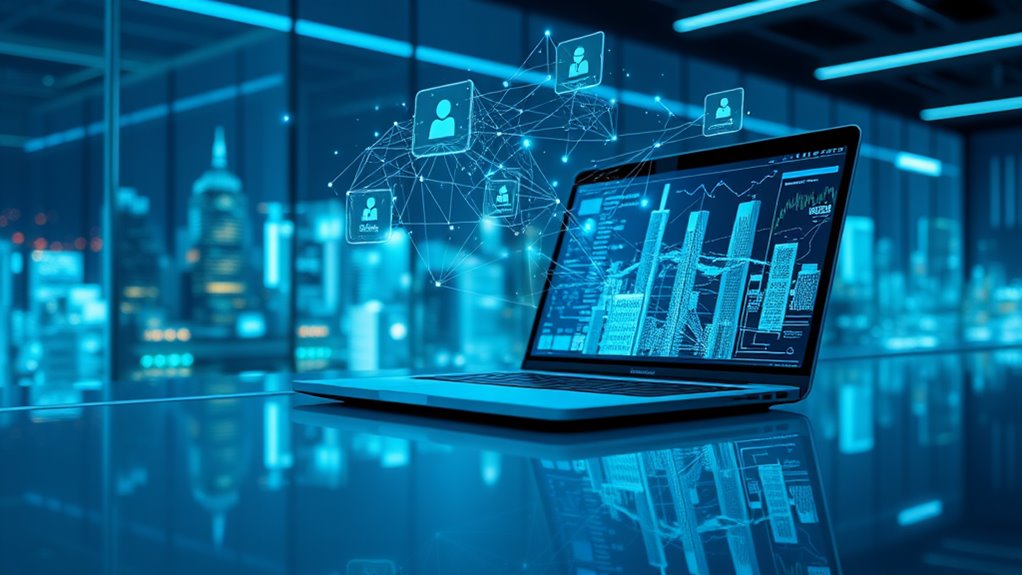
The integration of artificial intelligence (AI) into blockchain technology has significant implications for the evolution of smart contracts.
Initially introduced by Ethereum in 2015, traditional smart contracts offered features like decentralization and security but faced limitations, such as high gas fees and inflexibility.
The combination of AI enhances these contracts by introducing adaptive execution and predictive analytics. AI can analyze real-time data, allowing contracts to respond dynamically to changing conditions. Additionally, machine learning enables contracts to learn from previous transactions, improving their performance over time. Natural language processing makes contracts more accessible by interpreting human-written terms. Furthermore, the emergence of intent-based smart contracts enables these agreements to adapt to complex environments, enhancing their utility across various sectors.
AI-Driven Market Predictions
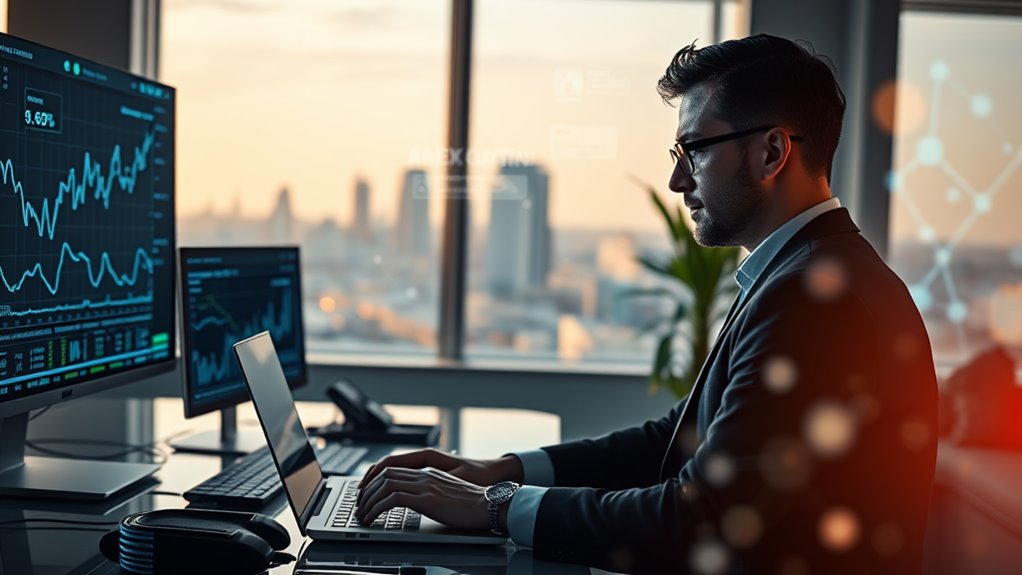
Artificial intelligence (AI) plays an essential role in enhancing market predictions within the cryptocurrency landscape. By collecting historical price data, news articles, and social media sentiment, AI algorithms analyze trends to forecast future movements.
Techniques such as machine learning, including Long Short-Term Memory (LSTM) and Support Vector Machines (SVM), are employed to identify patterns. Additionally, sentiment analysis helps gauge investor emotions, further refining predictions.
AI’s ability to process data in real time allows for quick reactions to market changes, while trend identification aids in recognizing bullish and bearish signals.
Although AI offers valuable insights, it also faces challenges, such as data quality issues and market volatility, which can affect the accuracy of its predictions.
Risk Management in Cryptocurrency Trading

How can traders effectively manage risks in the highly volatile world of cryptocurrency? Risk management is essential, as it involves predicting potential losses and implementing measures to reduce them.
Given the market’s volatility, strategies such as diversification across multiple cryptocurrencies are critical. Traders should utilize stop-loss orders to limit potential losses and monitor their risk/reward ratios to guarantee favorable trading conditions.
Dollar-cost averaging can also help mitigate risk by spreading investments over time. Emotional discipline is significant; decisions should be logical rather than impulsive. Additionally, understanding various trading strategies is crucial for adapting to market fluctuations and enhancing risk management practices.
Future Trends of AI in Blockchain and Crypto

The future of AI in blockchain and cryptocurrency is likely to be shaped by advanced predictive analytics, which can analyze large datasets to forecast market trends and enhance trading strategies.
Additionally, the emergence of decentralized AI marketplaces may facilitate the sharing of AI tools and algorithms, promoting innovation and collaboration.
Enhanced regulatory compliance tools powered by AI will also play a vital role in helping businesses adapt to the evolving legal landscape in the crypto space.
Advanced Predictive Analytics
As advancements in technology continue to unfold, predictive analytics in the domain of blockchain and cryptocurrency is becoming increasingly sophisticated. AI algorithms gather extensive data, such as historical prices, trading volumes, and social media sentiments, to enhance market predictions.
By integrating machine learning, these systems identify complex patterns that inform investment strategies and risk assessments. Real-time analysis allows traders to make swift decisions based on forecasted trends and potential volatility. Furthermore, the rise of institutional adoption is expected to significantly influence market dynamics, leading to more accurate predictive models.
Additionally, AI-driven insights improve decision-making and operational efficiency by automating processes and reducing costs. However, challenges remain, including data quality concerns and ethical implications surrounding privacy.
Decentralized AI Marketplaces
Decentralized AI marketplaces represent a notable evolution in the intersection of artificial intelligence and blockchain technology, enabling a more efficient and collaborative environment for AI development.
These platforms leverage blockchain integration to facilitate secure peer-to-peer transactions and maintain data integrity. Smart contracts manage essential tasks, such as payments and dispute resolutions, enhancing reliability.
Token-based economies incentivize participation, allowing users to earn rewards for contributing resources or services. Additionally, decentralized storage solutions like IPFS guarantee secure data handling.
As these marketplaces evolve, they are expected to support autonomous AI agents and promote global resource sharing, ultimately fostering transparency, scalability, and innovative revenue streams for developers and users alike.
This approach considerably enhances accessibility to AI technologies and applications.
Enhanced Regulatory Compliance
How can the integration of artificial intelligence (AI) enhance regulatory compliance within the blockchain and cryptocurrency sectors?
AI plays a crucial role in streamlining compliance processes by automating tasks such as transaction monitoring and customer due diligence.
With AI tools analyzing transaction patterns, suspicious activities can be detected more efficiently, improving fraud detection.
In addition, AI supports compliance with anti-money laundering regulations by identifying and reporting suspicious transactions.
The use of AI-driven platforms enables real-time monitoring and automated reporting, ensuring that financial institutions can meet regulatory demands effectively.
As regulatory frameworks evolve, AI enhances the accuracy and scalability of compliance solutions, allowing organizations to adapt to the growing complexity of compliance requirements in the crypto landscape. Furthermore, as seen in regions like the European Union, AI-driven compliance can help organizations navigate diverse regulatory landscapes more effectively.
Frequently Asked Questions
How Does AI Ensure the Integrity of Blockchain Data?
AI enhances blockchain data integrity through anomaly detection, predictive analysis, and smart contract auditing. It guarantees data remains immutable, validates inputs for accuracy, and fortifies security against unauthorized access, thereby maintaining trustworthiness in blockchain systems.
What Are the Ethical Concerns Surrounding AI in Crypto?
Ethical concerns surrounding AI in crypto juxtapose innovation and accountability. While AI enhances efficiency, it risks bias and transparency erosion, necessitating frameworks that balance technological advancement with fairness, privacy, and moral responsibility to guarantee equitable outcomes.
Can AI Replace Human Traders in Cryptocurrency Markets?
The question of whether AI can replace human traders in cryptocurrency markets remains complex. While AI excels in speed and data analysis, human judgment and adaptability are essential for traversing market volatility and unforeseen events.
How Does AI Impact Energy Consumption in Blockchain Mining?
Approximately 0.55% of global electricity consumption is attributed to Bitcoin mining. AI impacts this by optimizing energy use, enhancing hardware performance, and integrating renewable sources, yet also contributes to competitive electricity demands and carbon emissions.
What Role Does AI Play in Cryptocurrency Regulation Compliance?
AI plays an essential role in cryptocurrency regulation compliance by automating transaction monitoring, enhancing fraud detection, providing analytical insights for policymakers, and ensuring transparency, ultimately improving adherence to evolving regulatory frameworks across different jurisdictions.
Conclusion
In summary, the integration of AI into the domains of cryptocurrency and blockchain signifies a transformative shift, promising enhanced security, improved trading strategies, and effective risk management. As AI continues to evolve, it reshapes smart contracts and market predictions, illustrating the potential for greater scalability and informed decision-making. Ultimately, the question remains: will the synergy of AI and blockchain lead to a new era of innovation, or merely amplify existing challenges? The future holds the answer.










